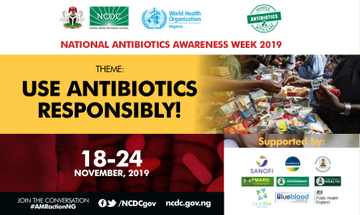Theme: Use Antibiotics Responsibly: The Future of Antibiotics Depends on You
The Federal Ministry of Health and the Nigeria Centre for Disease Control, in partnership with the Federal Ministry of Agriculture and Rural Development, Federal Ministry of Environment, World Health Organisation, key private sector and civil society organisations, are marking the 2019 National Antibiotics Awareness Week (NAAW). The NAAW is an annual national campaign to increase awareness across all sectors on the global threat of antibiotic resistance and to promote best practice of antibiotics usage among the general public, health workers and policy makers. The week is marked to increase awareness and prevent the further emergence and spread of antibiotic resistance. Nigeria’s commemoration is part of activities to observe the 2019 World Antibiotics Awareness Week.
Antibiotics are used worldwide in the treatment of bacterial infections in humans and animals. The effectiveness of antibiotics has also been its biggest challenge. The ease of access and overuse of antibiotics have resulted in an increasing resistance of bacteria to antibiotics, which is paradoxically leading to a loss of effectiveness. Antimicrobial resistance is a situation where micro-organisms treated with antibiotics develop immunity or become resistant to antibiotics due to misuse of the drugs. The emergence of multidrug-resistant organisms has led to an increasing burden of antimicrobial resistance in every region of the world affecting people of all ages and status. This can be reduced by a more targeted, responsible approach to the use of antibiotics.
With a series of planned activities, Nigeria will mark the week from the 18th to the 24th of November, 2019 to spread awareness and understanding of antimicrobial resistance, as well as promote responsible use of antibiotics among the general public.
A major activity to mark the week is the launch of a digital platform to document pledges from Nigerians to undertake behaviours encouraging responsible use of antibiotics. This is with the support of Public Health England, the UK’s public health institute. The platform, the Antibiotic Guardian Pledge (antibioticguardian.com/africa), is targeted at policy makers, health care professionals, students, farmers and Nigerians at large. It curates a set of pledges and encourages participants to commit to a pledge to ensure responsible use of antibiotics.
Other events to commemorate the 2019 National Antibiotics Awareness Week include:
- An awareness walk in Abuja, bringing partners and stakeholders together to create awareness on antimicrobial resistance in Nigeria and promote responsible antibiotic use.
- A Twitter campaign on antimicrobial resistance (AMR) to spread key messages on the social media in Nigeria using the hashtag #AMRactionNG and #NAAW2019. This holds on Monday 18th November and is open to the public.
- A Twitter chat with the Africa CDC, Public Health England and the NCDC on antimicrobial resistance (AMR) will take place on Wednesday, 20th November, 2019. Join the conversation on Twitter using the hashtags #AfricaWAAW, #NAAW2019 and #AMRactionNG.
- A training session organised for members of the media on how to report AMR accurately.
- Awareness visits to abattoir and livestock markets on Wednesday, 20th November, 2019.
- A training workshop for laboratory scientists on AMR at the NCDC National Reference Laboratory, Abuja.
- An inter-secondary school debate to engage young people.
Nigeria has successfully achieved milestones in the national fight against AMR. In November 2017, Nigeria conducted a situation analysis on the state of antimicrobial resistance in the country and developed a national action plan to build on strengths and address gaps identified in results from the analysis. In 2018, Nigeria began reporting actively to the Global Antimicrobial Resistance Surveillance System (GLASS), an initiative developed to support the global action plan on antimicrobial resistance. In the same year at the United Nations General Assembly (UNGA), Nigeria pledged and committed to scaling up national surveillance on AMR as part of the global AMR Challenge. This includes the development and distribution of a national toolkit for AMR stewardship in healthcare institutions in the country, as well as implementation of infection prevention and control programmes across health institutions.
The Nigeria Centre for Disease Control remains committed to protecting the health of Nigerians from the threat posed by antimicrobial resistance.
ABOUT NCDC
The Nigeria Centre for Disease Control (NCDC) is the government agency with the mandate to lead the prevention, detection, and control of communicable diseases. Its functions are to prevent, detect, investigate and control communicable diseases of national and international public health importance.


